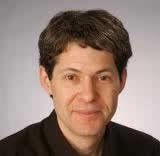SU, Jewish Federation of CNY present "Great Jewish Writers" lecture series
Ken Frieden kicks off series with Kafka lecture

The Judaic Studies Program in Syracuse University's College of Arts and Sciences is teaming up with the Jewish Federation of Central New York for the “Great Jewish Writers” lecture series. Supported by the federation’s Community Program Grant, the series begins with a free lecture about Franz Kafka by Ken Frieden, the B.G. Rudolph Professor in Judaic Studies, on Sunday, Oct. 23, at 2 p.m. at the Congregation Beth Sholom-Chevra Shas (18 Patsy Lane, Jamesville). For more information, call the Judaic Studies Program at 315-443-5671.
“We want to use this series to leverage public interest in Jewish literature and in our program, to strengthen the bond between SU and the Syracuse community, and to enhance the lives and minds of our citizens, especially seniors,” says Harvey Teres, associate professor of English and director of the Judaic Studies Program. “This project will go a long way toward cultivating deeper, more abiding connections with people of all backgrounds.”
Former director of SU’s Judaic Studies Program, Frieden is an accomplished scholar-teacher who specializes in Yiddish and Jewish texts. His presentation will focus on some of Kafka’s shorter stories, many of which may be interpreted as parables.
“Kafka’s stories and parables can be elusive, leading readers into a labyrinth of possibilities,” says Frieden, also an accomplished Klezmer scholar and bandleader. “My lecture will provide a guided tour of the hidden recesses in Kafka’s maze, but it certainly won’t dispel any enigmas.”
Regarded as one of the 20th-century’s most influential writers, Kafka produced a vast body of work, most of which was left unfinished or was destroyed at the time of his death. In recent years, the term “Kafkaesque” has come to refer to anything that is bizarre or complex.
The series continues with the following SU speakers:
Sanford Sternlicht G’62, English professor emeritus
Tuesday, Oct. 25, 7 p.m.
Temple Concord (910 Madison St., Syracuse)
“We want to use this series to leverage public interest in Jewish literature and in our program, to strengthen the bond between SU and the Syracuse community, and to enhance the lives and minds of our citizens, especially seniors,” says Harvey Teres, associate professor of English and director of the Judaic Studies Program. “This project will go a long way toward cultivating deeper, more abiding connections with people of all backgrounds.”
Former director of SU’s Judaic Studies Program, Frieden is an accomplished scholar-teacher who specializes in Yiddish and Jewish texts. His presentation will focus on some of Kafka’s shorter stories, many of which may be interpreted as parables.
“Kafka’s stories and parables can be elusive, leading readers into a labyrinth of possibilities,” says Frieden, also an accomplished Klezmer scholar and bandleader. “My lecture will provide a guided tour of the hidden recesses in Kafka’s maze, but it certainly won’t dispel any enigmas.”
Regarded as one of the 20th-century’s most influential writers, Kafka produced a vast body of work, most of which was left unfinished or was destroyed at the time of his death. In recent years, the term “Kafkaesque” has come to refer to anything that is bizarre or complex.
The series continues with the following SU speakers:
Sanford Sternlicht G’62, English professor emeritus
Tuesday, Oct. 25, 7 p.m.
Temple Concord (910 Madison St., Syracuse)
Topic: Isaac Bashevis Singer, late novelist and short-story writer who, in 1978, became the only Yiddish author to win a Nobel Prize in Literature
Harvey Teres
Tuesday, Nov. 29, 7:30 p.m.
Temple Adath Yeshurun (450 Kimber Rd., Syracuse)
Topic: Grace Paley, late writer and activist who served as New York’s first official state author and as poet laureate of Vermont
Sarah Wobick-Segev, postdoctoral teaching fellow in Judaic studies
Tuesday, Feb. 28, at 7:30 p.m.
The Oaks Retirement Community (4101 East Genesee St., Syracuse)
Topic: Lea Goldberg, late poet, author, critic and scholar at Hebrew University in Jerusalem, and Else Lasker-Schüller, late poet, writer and artist who was an influential member of Berlin’s artistic community
Erella Brown, assistant professor of languages, literatures and linguistics
Monday, April 23, at 7:15 p.m.
Shaarei Torah Orthodox Congregation of Syracuse (4313 East Genesee St., Syracuse)
Topic: Shmuel Yosef Agnon, late novelist, short-story writer and poet who, in 1966, won the Nobel Prize in literature
Miriam Elman, associate professor of political science
Wednesday, April 25, at 7 p.m.
Jewish Community Center of Syracuse (5655 Thompson Rd., Syracuse)
Topic: David Grossman, living author, social activist and critic of Israeli policy toward Palestinians
Last year, the Judaic Studies Program received a $50,000 matching grant from the Foundation for Jewish Culture to hire Wobick-Segev as a postdoctoral teaching fellow. Judaic studies is an all-University interdisciplinary program, administered by The College.
Harvey Teres
Tuesday, Nov. 29, 7:30 p.m.
Temple Adath Yeshurun (450 Kimber Rd., Syracuse)
Topic: Grace Paley, late writer and activist who served as New York’s first official state author and as poet laureate of Vermont
Sarah Wobick-Segev, postdoctoral teaching fellow in Judaic studies
Tuesday, Feb. 28, at 7:30 p.m.
The Oaks Retirement Community (4101 East Genesee St., Syracuse)
Topic: Lea Goldberg, late poet, author, critic and scholar at Hebrew University in Jerusalem, and Else Lasker-Schüller, late poet, writer and artist who was an influential member of Berlin’s artistic community
Erella Brown, assistant professor of languages, literatures and linguistics
Monday, April 23, at 7:15 p.m.
Shaarei Torah Orthodox Congregation of Syracuse (4313 East Genesee St., Syracuse)
Topic: Shmuel Yosef Agnon, late novelist, short-story writer and poet who, in 1966, won the Nobel Prize in literature
Miriam Elman, associate professor of political science
Wednesday, April 25, at 7 p.m.
Jewish Community Center of Syracuse (5655 Thompson Rd., Syracuse)
Topic: David Grossman, living author, social activist and critic of Israeli policy toward Palestinians
Last year, the Judaic Studies Program received a $50,000 matching grant from the Foundation for Jewish Culture to hire Wobick-Segev as a postdoctoral teaching fellow. Judaic studies is an all-University interdisciplinary program, administered by The College.
Media Contact
Rob Enslin
